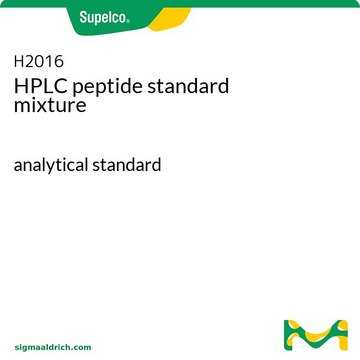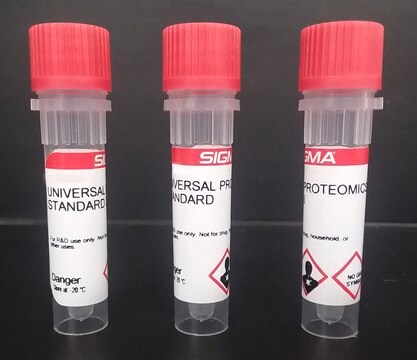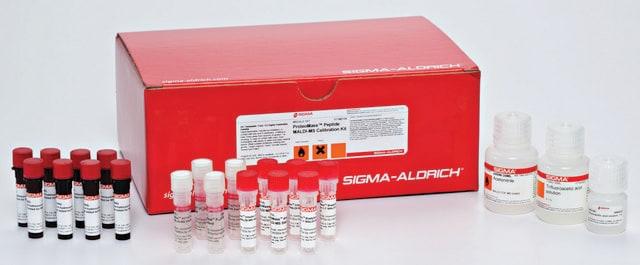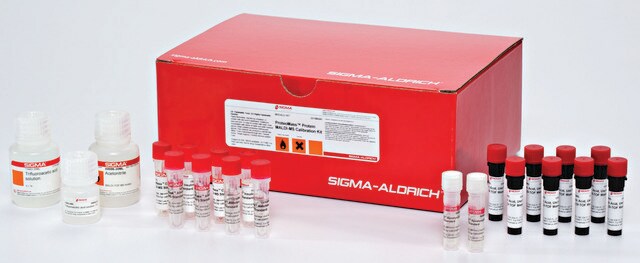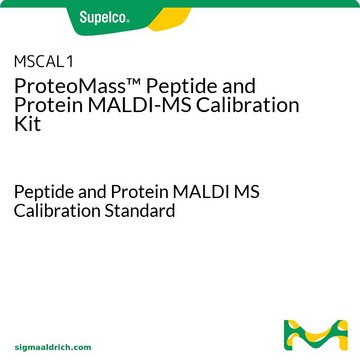Wszystkie zdjęcia(1)
Key Documents
MSP1L
MS PhosphoMix 1 Light
Phosphopeptide Standard for MS
Synonim(y):
Light PhosphoMix, PhosphoMix 1 Light
Zaloguj sięWyświetlanie cen organizacyjnych i kontraktowych
About This Item
Kod UNSPSC:
12352200
NACRES:
NA.24
Polecane produkty
jakość
Phosphopeptide Standard for MS
Poziom jakości
klasy chemiczne analitów
amino acids, peptides, proteins
opakowanie
pkg of 200 pmol total phosphopeptides
metody
HPLC: suitable
LC/MS: suitable
Zastosowanie
food and beverages
format
multi-component solution
temp. przechowywania
−20°C
Opis ogólny
The MS PhosphoMix line of products allows for the testing of the strengths and weaknesses of phosphopeptide sample processing, mass spectrometry analysis and instrument configurations. The mixes are produced from synthetic phosphopeptides with sequences derived from naturally occurring peptides as identified by Mann et al. in HeLa cells. Because the sequences are derived from mammalian cells, many natural phosphorylation motifs, such as those that present an abundance of proline, are represented. Additionally, the phosphopeptide distribution in each mix has been chosen to present a broad range of characteristics, including ionizability, LC retention time, charge state, and isoelectric point. Finally, PhosphoMix-1, 2, and 3 were designed in a complementary fashion, as highlighted on the following page. For example, all three mixes contain peptides of the same sequence with different sites of phosphorylation.
Each of the three phosphopeptides mixes are available in their naturally occurring isotopic abundances (light) or as stable isotope enriched versions (heavy), making the set of products highly amenable to quantitative analyses, allowing users to compare recovery between workflows or techniques.
More info and FASTA file
Each of the three phosphopeptides mixes are available in their naturally occurring isotopic abundances (light) or as stable isotope enriched versions (heavy), making the set of products highly amenable to quantitative analyses, allowing users to compare recovery between workflows or techniques.
- Naturally occurring peptide sequences
- Broad range of peptide characteristics
- Complementary product designs
- Available in light and heavy versions
More info and FASTA file
This page may contain text that has been machine translated.
produkt powiązany
Numer produktu
Opis
Cennik
Kod klasy składowania
11 - Combustible Solids
Klasa zagrożenia wodnego (WGK)
WGK 3
Temperatura zapłonu (°F)
Not applicable
Temperatura zapłonu (°C)
Not applicable
Certyfikaty analizy (CoA)
Poszukaj Certyfikaty analizy (CoA), wpisując numer partii/serii produktów. Numery serii i partii można znaleźć na etykiecie produktu po słowach „seria” lub „partia”.
Masz już ten produkt?
Dokumenty związane z niedawno zakupionymi produktami zostały zamieszczone w Bibliotece dokumentów.
Klienci oglądali również te produkty
Jordy J Hsiao et al.
Analytical chemistry, 90(15), 9457-9464 (2018-07-07)
Phosphorylated compounds and organic acids with multiple carboxylate groups are commonly observed to have poor peak shapes and signal in LC/MS experiments. The poor peak shape is caused by the presence of trace metals, particularly iron, contributed from a variety
Dorte B Bekker-Jensen et al.
Nature communications, 11(1), 787-787 (2020-02-09)
Quantitative phosphoproteomics has transformed investigations of cell signaling, but it remains challenging to scale the technology for high-throughput analyses. Here we report a rapid and reproducible approach to analyze hundreds of phosphoproteomes using data-independent acquisition (DIA) with an accurate site
Evgeny Kanshin et al.
Journal of proteome research, 12(6), 2905-2913 (2013-04-24)
Phosphorylation is a reversible protein modification that regulates major cellular processes such as cell division, growth, and differentiation through highly dynamic and complex signaling pathways. Large-scale phosphoproteomics analyses have been greatly facilitated using affinity chromatography such as metal oxide affinity
Daniel Schwartz et al.
Nature biotechnology, 23(11), 1391-1398 (2005-11-08)
With the recent exponential increase in protein phosphorylation sites identified by mass spectrometry, a unique opportunity has arisen to understand the motifs surrounding such sites. Here we present an algorithm designed to extract motifs from large data sets of naturally
Alexander R Ivanov et al.
Proteomics, 13(6), 904-909 (2013-01-16)
Proteomics is a rapidly transforming interdisciplinary field of research that embraces a diverse set of analytical approaches to tackle problems in fundamental and applied biology. This viewpoint article highlights the benefits of interlaboratory studies and standardization initiatives to enable investigators
Nasz zespół naukowców ma doświadczenie we wszystkich obszarach badań, w tym w naukach przyrodniczych, materiałoznawstwie, syntezie chemicznej, chromatografii, analityce i wielu innych dziedzinach.
Skontaktuj się z zespołem ds. pomocy technicznej



